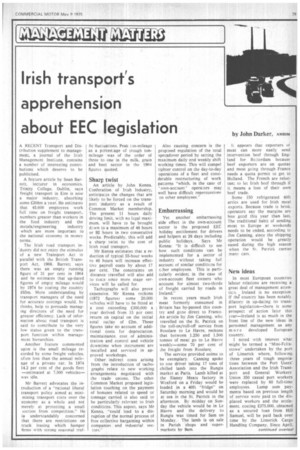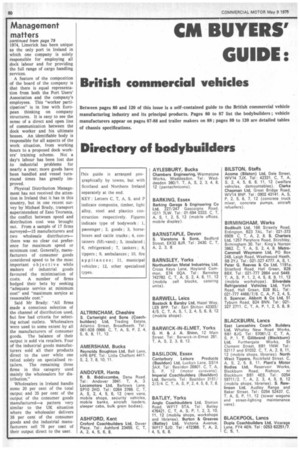Irish transport's apprehension
Page 69

Page 70

If you've noticed an error in this article please click here to report it so we can fix it.
about EEC legislation by John Darker, AMB1M
A RECENT Transport and Distribution supplement to management, a journal of the Irish Management Institute, contains a number of interesting contributions which deserve to be publicised.
A feature article by Sean Barrett, lecturer in economics. Trinity College, Dublin, says freight transport in Eire is now a major industry, absorbing some £208m a year. He estimates that 45.600 employees work full time on freight transport, numbers greater than workers in the food industry and the metals/engineering industry which are more important to the national economy in money terms.
The Irish road transport industry did not enjoy the stimulus of a new Transport Act in parallel with the British Transport Act, 1968. Barrett says there was an empty running figure of 31 per cent in 1964 and he estimates that up-dated figures of empty mileage would by 1974 be costing the country E65m. More understanding by transport managers of the need for accurate costings would, he thinks, help to persuade managing directors of the need for greater efficiency. Lack of information about road transport is said to contribute to the very low status given to the transport function within management hierarchies
Another feature commented upon is the small mileage recorded by some freight vehicles. often less than the annual mileage of a private car. In 1974 14.2 per cent of the goods fleet —estimated at 7,500 vehicles— was idle.
Mr Barrett advocates the introduction of a "rational liberal transport policy aimed at minimising transport costs over the economy as a whole and not merely at protecting a small section from competition." He is understandably concerned that there are restrictions on truck leasing which hamper firms with strong seasonal traf fic fluctuations. Peak tan-mileage as a percentage of trough tonmileage was of the order of three to one in the milk, grain and beet sector in the 1964 figures quoted.
Sharp twist
An article by John Kenna. Conferation of Irish Industry, anticipates the changes that are likely to be forced on the transport industry as a result of Common Market membership. The present 11 hours daily driving limit, with no legal maximum. will have to be brought deven to a maximum of 48 hours or 92 hours in two consecutive weeks. Predictably, this will add a sharp twist to the cost of Irish road transport.
Mr Kenna estimates that a reduction of typical 55-hour weeks to 46 hours will increase effective payroll costs by about 17 per cent. The constraints on distance travelled will also add to costs since more stage services will be called for.
Tachographs will also prove expensive. Mr Kenna reckons 11972 figures) some 20,000 vehicles will have to be fitted at a cost exceeding £300,000 a year derived from 15 per cent return on capital on the initial total outlay of E2m. These figures take no account of additional costs for depreciation. maintainance. cost of administration and control and vehicle dcwntime when instrument are installed and serviced in approved workshops.
Other indirect costs arising from the introduction of tachographs relate to new working arrangements negotiated with the trade unions. The other Common Market proposed legislation touching on the payment of bonuses related to speed or tonnage carried is also said to be particularly relevant to Irish conditions. This aspect, says Mr Kenna, "could lead to a disruption of the normal process of free collective bargaining within companies and industrial sectors." Also causing concern is the proposed regulation of the total spreadover period by setting the maximum daily 2,nd weekly shift working times. This will compel tighter control on the day-to-day operations of a fleet and considerable restructuring of work patterns "which, in the case of ' own-account' opera:ors may well have difficult repercussions on other employees."
Embarrassing
Yet another embarrassing side effect in the own-account sector is the proposed EEC holiday entitlement for drivers and helpers at 28 days including public holidays, Says Mr Kenna: "It is difficult to see how such conditions can be implemented for a sector of industry without taking full account of similar conditicns for ether employees. This is particularly evident in the case of own-account fleet owners who account for almost two-thirds cf freight carried by roads in Ireland."
In recent years much Irish meat formerly consumed in Britain has by-passed this country and gone direct to France. An article by Jim Canning, who travelled on the St. Patrick on the roll-on/roll-off service from Rosslare to Le Havre, reckons that between 1,250 and 1.500 tonnes of meat go to Le Havre weekly—some 70 per cent of the freight from Rosslare.
The service provided seems to be exemplary. Canning spoke to one driver taking 17 tons of chilled lamb into the Rungis market at Paris. Lamb killed at the Slaney Meats factory in Wexford on a Friday would be loaded in a 40ft "fridge" on Saturday morning and would be at sea in the St. Patrick in the afternoon. By midday on Sunday the vehicle would be in Le Havre and the delivery to Rungis was timed for 5am on Monday. The lamb is on sale in Parish shops and supermarkets by 9am. It appears that exporters ol meat can more easily send intervention beef through England for Ro:terdam because beef exporters are on quotas and meat going through France needs a quota permit to get to Holland. The French are reluctant to let Irish beef through if it means a loss of their own beef trade.
Some 150 refrigerated 40ft artics are used for Irish meat exports. Because trade is brisk. operators say the margins are less good this year than last. The traditional habit of sending meat to Europe at weekends needs to be ended. according to Jim Canning, since the shipping operation would be greatly eased during the high season when the St. Patrick carries many cars.
New ideas
In most European countries labour relations are receiving a great deal of management attenticn. Ireland is no exception. If the' country has been notably dilatory in up-dating its transport legislation—there is some prospect of action later this year—Ireland is as much in the front line of the new ideas in personnel management as any more developed European country.
I noted with interest what might be termed a "Mini-Felixstowe" undertaken by the port of Limerick where, following three years of tough negotiations between the Port Users' Association and the Irish Transport and General Workers Union 350 casual port workers were replaced by 60 full-time employees. Lump sum payments based on previous length of service were paid to the displaced workers and the settlement. costing £375,000, obtained as a secured loan from Hill Samuel, will be paid back over time by the Limerick Cargo Handling Company. Since April, 1974, Limerick has been unique as the only port in Ireland in which one company is solely responsible for employing all dock labour and for providing the full range of cargo handling services.
A feature of the composition of the board of the company is that there is equal representation from both the Port Users' Association and the company's employees. This "worker participation" is in line with European thinking on company structures. It is easy to see the sense of a direct and open line of communication between the dock worker and his ultimate bosses. An identifiable body is responsible for all aspects of the work situation, from working hours to a proposed dock workers' training scheme. Not a day's labour has been lost due to industrial problems for nearly a year; more goods have been handled and vessel turnround times has greatly improved.
Physical Distribution Management has not received the attention in Ireland that it has in this country, but in one recent survey by Michael Brady, transport superintendent of Esso Teoranta, the conflict between speed and distribution cost was brought out. From a sample of 17 firms surveyed-15 manufacturers and two wholesale distributors— there was no clear cut preference for maximum speed or minimum cost. Generally, manufacturers of consumer goods considered speed to be the most important objective while makers of industrial goods favoured the minimisation of costs. A number of firms hedged their bets by seeking "adequate service at minimum Cost" and "maximum service at reasonable cost."
Said Mr Brady; "All firms made a conscious selection of the channel of distribution used, but few had criteria for selecting actual outlets. Wholesalers were used to some extent by all the manufacturers of consumer goods. The balance of their Output is sold via retailers. Four of the industrial goods manufacturers sold all their products direct to the user while one relied solely on specialised retailers. The remaining three firms in this category used mainly the wholesalers for distribution."
Wholesalers in Ireland handle some 20 per cent of the total output and 35 per cent of the output of the consumer goods manufactured—a pattern very similar to the UK situation where the wholesaler delivers 38 per cent of the consumer goods and the industrial manufacturers sell 76 per cant of their output direct to the user.




























































































































































